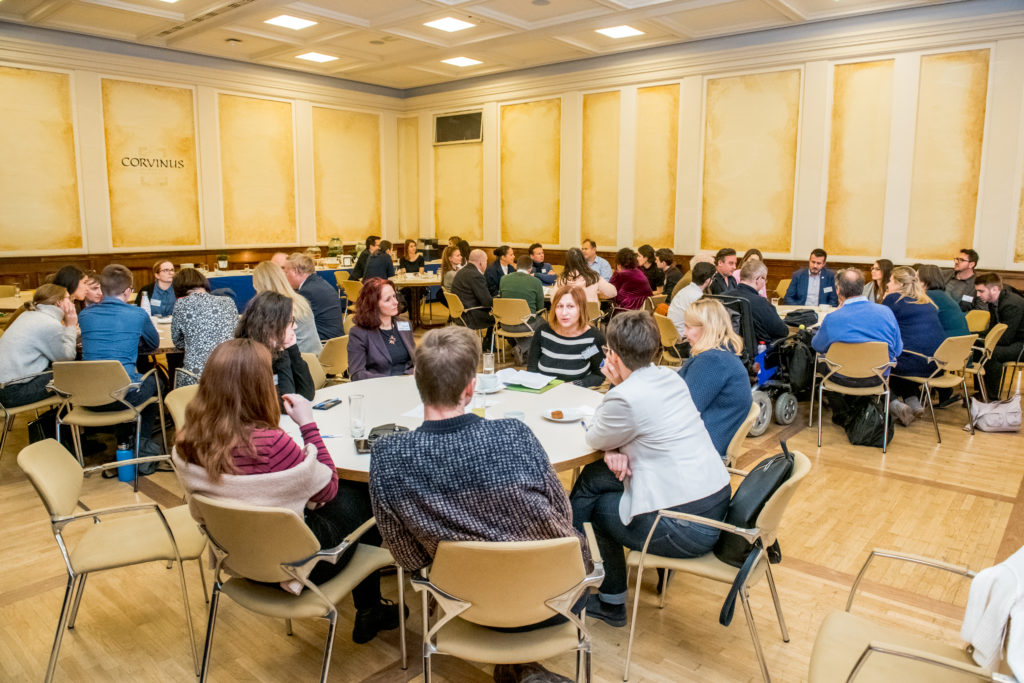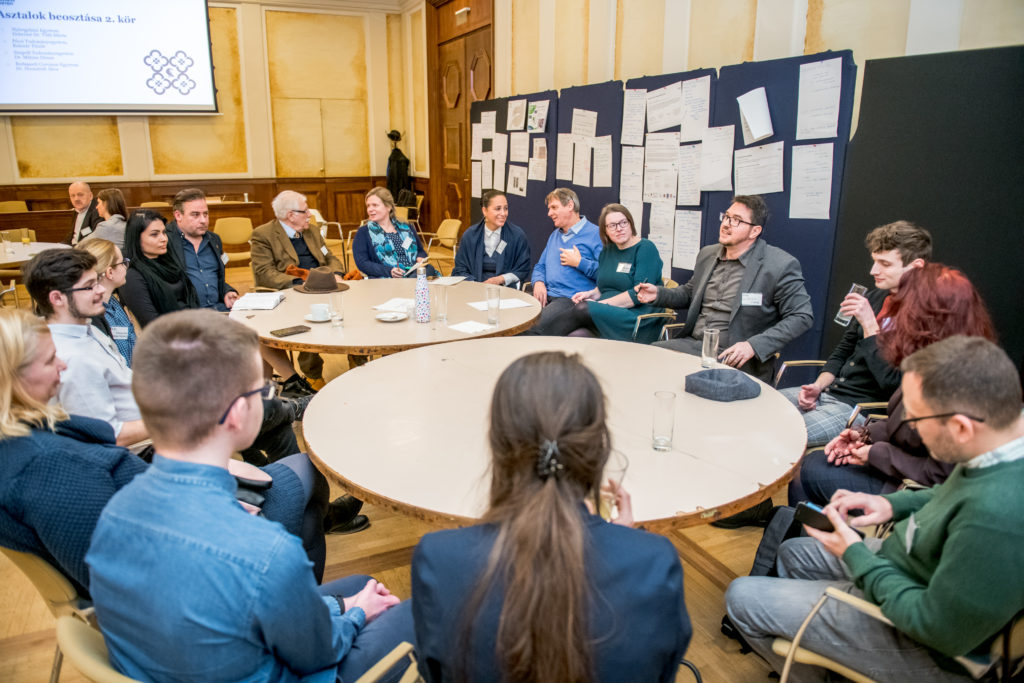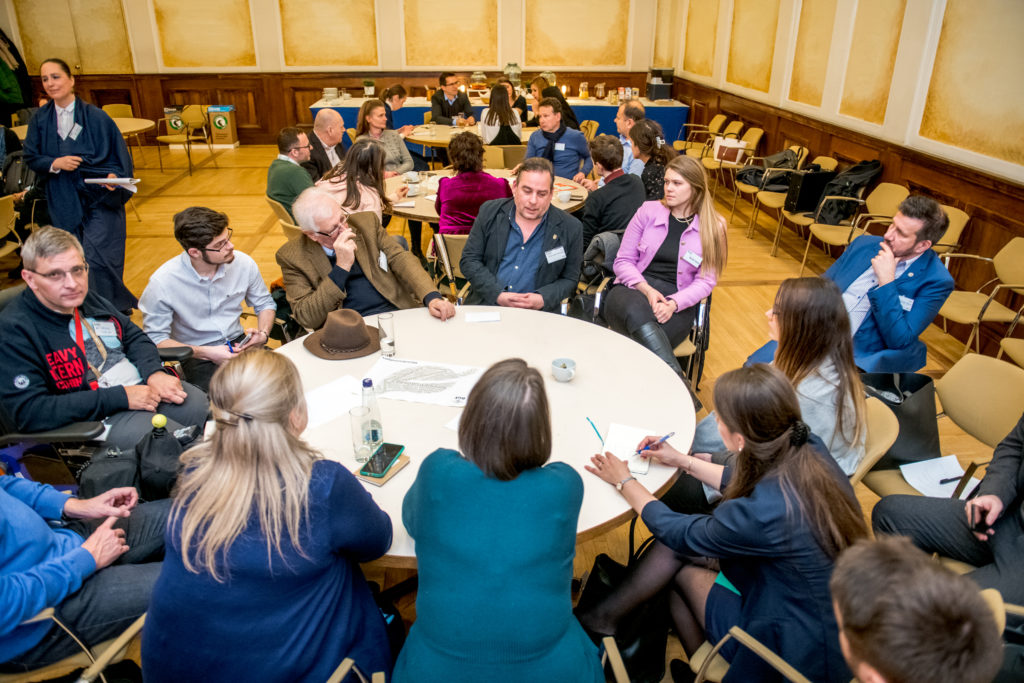Sustainability strategy and project ideas with community involvement

A new sustainability strategy is under development at the Corvinus with the involvement of university citizens. At the ERS Agora, the participants had a chance to share their ideas in the subjects of education, research, networking and cooperation, and organisation and operation, and these ideas will be incorporated into the strategy under development.
In the field of education, beside raising students’ awareness, it was also raised that the sustainability approach should be incorporated into as many subjects as possible.
In the case of research, certain objectives were set to strengthen students’ researcher approach and to make sure marketable researches are conducted in the subjects of sustainability, that give real answers to real problems, are useful for the society and can be used by the University and the companies.
In the field of networking and cooperation, the participants pointed out authenticity. It is is important that the University should set a good example for both external and internal stakeholders, and it should support the responsible economic and social players of the region.
From the aspect of organisation and operation, the objective is to make the University a place where equal treatment, accessibility and the integration of international students are systematically realised through involvement, and the digital infrastructure is also improved to reduce the burden on the environment.
The purpose of the event was to allow the staff and the students of the University to tell their opinions, so that existing views could be represented in the widest possible scope in the document under production. Dr. Ágnes Zsóka, Vice-Rector for Academic Development and Márton Barta, Head of Strategy explained in their introduction that they wished to achieve the objectives set in the strategy with top-down commitment and bottom-up initiatives and building.

Producers’ market and happiness festival among the project ideas
In the second part, the participants were thinking about specific ethic, responsibility and sustainability project ideas, in the fields of well-being, equal chances, operational sustainability and awareness-raising at the university.
The importance of building community at the university was raised in most project ideas. These are actions like the clothes exchange programme supporting sustainable fashion, or the producers’ market at the University, selling healthy local products, which is a requirement of students, too – according to the research – .
The programme ideas included happiness festival, week of abilities, mental week, and participants thought of activities like the sustainability action of the month, supporting employee and student well-being in a holistic way, awareness-raising about vulnerable groups, or level balancing at the academic tracks for the sake of accessibility.
The possibility of eating healthy food was mentioned in several groups in the conversations. The green cafeteria or any other healthy lunch option was an important topic for many, and people had a chance to discuss the related limitations and possibilities with Ákos Domahidi, Chancellor. Other ideas focused on the way sustainability awareness-raising could be included in the communication of the University with even bigger emphasis, and how to make sure that there is real content behind the projects, instead of greenwashing.
You can join the above listed projects or initiate new projects on the ERS Hub site, in the Join menu point.

9 Hungarian universities shared their experiences related to sustainability projects with one another
Escape room along the sustainability objectives of the UN, eco-mapping in the university campus, floating waste-collector on the Danube, kilometre-collecting programme for bikers, green week for climate consciousness, community involvement for more sustainable operation, waste-reducing campaign, international on-line sustainability course – these are the sustainability practices that universities showed each other in the third part of the ERS Agora.
The event was the first forum of the inter-university cooperation called Sustainability Platform of Hungarian Universities, in which, in addition to the Corvinus, the Budapest Business School, the Budapest Metropolitan University, the Budapest University of Technology and Economics, the Eszterházy Károly Catholic University, the Hungarian University of Agriculture and Life Sciences, the University of Pécs and the University of Szeged participated as members of the Platform, while the Széchenyi István University participated as an interested party.
A common experience of the programme was that sustainability at project level is already present at most universities, and it is integrated into the strategy of universities and the operation of organisations at more and more places. The participants emphasised: beside the most important objectives, such as combating climate change and solving the ecological crisis, the sustainability attempts might even bring a competitive advantage to Hungarian universities at international level.
We initiated this meeting with the intention of making a tradition, which we would like to continue in this cooperation, in a way that each meeting is organised by a specific partner. The sharing of good practices and the regular exchange of experiences will allow universities to use their joint efforts and establish interdisciplinary and cross-disciplinary firm cooperation, even joint projects to promote sustainability, said Ágnes Zsóka, professor.
The event was hosted, beside the Vice-Rector, by Dr. Katalin Ásványi, Associate Professor and Head of the Department of Sustainability Management and Environmental Economics, Chair of the Steering Committee of the ERS Hub that organised the event. The process of thinking together was moderated by Dr. Alexandra Köves, Associate Professor of the Department of Decision Sciences in the Institute of Operations and Decision Sciences.